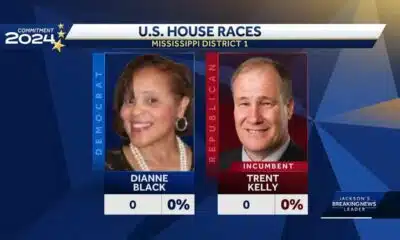Mississippi News
Lawmakers will be hard pressed to ban medication abortion, advocates say
Can lawmakers keep abortion pills out of Mississippi? Local, international activists say no.
In the days after the leak of a draft opinion showing the U.S. Supreme Court will likely overturn Roe v. Wade, hundreds of Mississippians visited the website Plan C to learn about ordering abortion medication online.
From Jackson and Long Beach, Oxford and tiny Centerville, people used the site to find out how to obtain the pills that will likely become the easiest, cheapest way to end a pregnancy in post-Roe Mississippi.
In the last week of April, 175 people in the state went to the site. In the first four days of May, around the time the leak was published on the evening of May 2, that number rose to 306, according to Elisa Wells, a co-founder of Plan C, which doesn’t ship pills itself but helps people find how to get them.
The next week, traffic stayed elevated, at 275.
Opponents and supporters of abortion rights agree: After Roe, the future of the abortion fight in Mississippi lies in a set of pills that can end a pregnancy under 10 weeks.
Mississippi law forbids the use of telehealth to prescribe the medication. But the founder of the organization Aid Access, Dr. Rebecca Gomperts, is based in Austria, and when she writes a prescription for a Mississippian, she is following that country’s laws.
She sends the prescription to a pharmacist in India, who can mail them right to a doorstep in Belzoni or Biloxi. People can also buy the pills directly from online pharmacies based overseas.
Anti-abortion lawmakers have vowed to crack down on the cross-border transactions that bring the medication here, where strict laws have left just one abortion clinic standing. But they’ll face determined opposition from local activists allied with prescribers and pharmacies scattered around the world.
“With all of the medical technology we have now, it’s ludicrous for the antis (anti-abortion advocates) to think we aren’t going to do it and help each other,” said Michelle Colón, executive director of SHERo Mississippi, a nonprofit that aims to promote leadership among Black women and girls in the state. “We are going to do it right under their noses, and they won’t know, or they will know it, but they’re not going to be able to prove it.”
At Jackson Women’s Health Organization, Mississippi’s only abortion clinic, more than half of patients get medication abortions. Mississippi law requires them to take the first pill, mifepristone, which stops the pregnancy from growing, at the clinic.
READ MORE: Abortion in Mississippi – our full coverage
The next set of pills, misoprostol, opens the cervix and triggers cramping and bleeding to end the pregnancy in a process that looks like a miscarriage.
The U.S. Food and Drug Administration approved the pills in 2000. In December, the federal government permanently authorized telemedicine prescriptions for the drugs, but Mississippi and other states ban that practice.
Yet buying the pills outside of the formal medical system is not uncommon for Mississippians. A 2020 study examined more than 6,000 requests from U.S. residents for abortion pills from an online telemedicine service in 2017 and 2018. It found that Mississippians requested the pills more frequently than people in any other state, likely a consequence of the barriers to accessing abortion through in-state providers.
The state’s 2007 trigger law, which will go into effect if the Supreme Court overturns Roe, bans abortion except in cases of rape and when the mother’s life is in danger. It doesn’t make a distinction between different types of abortion, so it will prohibit medication abortions as well as surgical procedures.
But lawmakers see a need for additional action against the pills.
Sen. Joey Fillingane, R-Sumrall, has authored numerous abortion restrictions. A separate law regarding medication abortion could help direct law enforcement to focus on that issue, and the Legislature could also allocate funding to support that work, he said.

“We know this is a new layer of law enforcement that we’re going to be expecting of you, in the agency, attorney general’s office — whomever it’ll apply to. You’re going to need more staff, you’re going to need more resources in order to enforce that new law,” Fillingane said in an interview with Mississippi Today. “It could very well be not only a directive further fleshing out the trigger law language, but also an appropriations bill that sends money to that agency and agencies that will be tasked with enforcing the law.”
Fillingane says a prohibition on abortion drugs could be enforced through lawsuits against the people, organizations and manufacturers sending prohibited medications into Mississippi.
Mississippi’s reproductive rights activists don’t see how that could work given that many providers and pharmacies are based abroad.
“I’m not sure where (Fillingane) thinks the pills are going to be coming from,” said Laurie Bertram Roberts, co-founder of the Mississippi Reproductive Freedom Fund and executive director of the Alabama-based Yellowhammer Fund. “Arkansas? He’s just going to, like, come on over there in his seersucker suit and demand that these people be prosecuted? He’s not going to go over to Austria and impress anyone and round up Rebecca Gomperts. … India’s not going to be impressed by Joey Fillingane and let him come over there and round people up and jail them.”
If the past is any indicator, Gomperts — an abortion rights advocate — won’t be swayed by the state of Mississippi. The FDA sent Aid Access a warning letter in 2019 telling it to stop selling “misbranded and unapproved new drugs” in the U.S., because the specific brands Aid Access provides its patients are not FDA-approved.
Gomperts has continued to operate the site.
The organization works with pharmacies based in India because generics produced in the country are high quality and government-supervised, she has said. She sees strict regulation of abortion medication as based on politics.
Research shows medication abortion is safe: The FDA recorded 22 deaths among people who used mifepristone from 2000 to 2017, an average of one in 155,000, compared to a maternal mortality rate of 17 in 100,000 as of 2018. In February, a study in the Lancet found that 1% of people who used Aid Access’ services to end a pregnancy reported requiring medical treatment, either through a blood transfusion or IV antibiotics, a higher rate than recorded in clinical settings, but one researchers still described as rare.
Christie Pitney is a certified nurse midwife and a U.S.-based clinician for Aid Access. She and her colleagues in the U.S. provide telemedicine services for patients in states where that is legal, while Gomperts handles prescribing for patients where that practice is banned. Pitney said state laws won’t stop Aid Access from operating.
“Aid Access and our attorney are confident that there’s just no jurisdiction within the states to regulate Dr. Gomperts and stop her from providing those services,” she said. “So it will definitely continue to be available in Mississippi, unless they remove the fact that it’s a federal crime to open someone else’s mail. Until they get to that level, we’ll still be here.”
More generally, the law in this area is murky and contested. If a provider in California was complying with California laws when prescribing a medication abortion for a patient in Mississippi, legal questions arise: Which state would have jurisdiction? Even if a state could prevail in a lawsuit against an overseas provider, how would it enforce the judgment?
“They don’t keep money in Mississippi,” said Elizabeth Sepper, a law professor at the University of Texas and an expert on health law. “There’s not a bank account that Aid Access has that the state can draw upon to recover the judgment. So it just may have little effect on Aid Access. Or no effect, I should say.”
Fillingane said enforcement of laws banning abortion medication could work like other drug laws in Mississippi. But there’s no clear precedent for states banning and criminalizing drugs that are FDA-approved, safe and widely used around the country.
The warning letter to Aid Access came from the FDA because the federal government is responsible for regulating the trade through which pharmaceuticals are distributed around the country.
“We’re in a big, huge, gray zone, and nobody really knows exactly how it will end,” said Laurie Sobel, associate director for women’s health policy at KFF, a nonprofit focused on health policy research.
This legal gray area is playing out in a Mississippi lawsuit.
GenBioPro, the manufacturer of a generic version of mifepristone, sued State Health Officer Dr. Thomas Dobbs and the health department in 2020, arguing that the state’s strict regulations conflict with the FDA’s rules.
In many ways, Mississippi law treats abortion pills like any other abortion, requiring patients to go through a counseling session and ultrasound before taking mifepristone in a doctor’s presence at the clinic. The FDA, however, allows more practitioners to prescribe mifepristone and says patients can take the pill in their own homes.
The GenBioPro lawsuit claims it is unconstitutional for states to regulate FDA-approved substances much more stringently than the federal authorities because the commerce clause of the U.S. Constitution explicitly gives the federal government the authority to regulate interstate commerce, and implicitly prohibits states from passing laws that excessively burden that commerce.
A Massachusetts ban on Zohydro, a new and controversial but FDA-approved opioid, was overturned by a federal court that found the state ban was preempted by federal law. But legal experts interviewed by Mississippi Today said there’s little case law in this area otherwise.

Regardless of how preemption arguments play out, advocates and attorneys believe it will be easier and more common for states to enforce medication abortion bans by prosecuting people inside their borders. That could be friends or relatives who share abortion medication with a pregnant person, or even pregnant people themselves in states that criminalize self-managed abortions.
Pitney said Aid Access recognizes patients in states like Mississippi will assume greater legal risk if Roe is overturned. The organization refers patients to the legal helpline operated by the nonprofit If/When/How.
Mississippi’s trigger law banning abortion in most cases specifies that it can’t be used to prosecute a woman for ending her own pregnancy, but any person who “knowingly or recklessly performs or attempts to perform or induce an abortion in the State of Mississippi” can be sentenced to up to 10 years in prison.
The state also has a law against the “killing of an unborn child” that applies starting at conception. The law states it doesn’t apply to any lawful abortion, but if all abortions become unlawful in Mississippi, it could also be used to prosecute attempts to end a pregnancy, and there’s no exception protecting a pregnant person from such prosecution.
The technological advances that created medication abortion mean that post-Roe, criminalized abortions will be much safer than they were before 1973. But those advances also mean that people could be subjected to new levels of state scrutiny if police and prosecutors take a hard line in enforcing medication abortion bans.
“Everyone is carrying around tiny little computers in their hands,” Elizabeth Sepper, law professor and health care expert at the University of Texas, said. “States will probably engage in electronic surveillance, figuring out who are the actors most likely to be distributing these particular pills, tracking them, determining who they are in communication with.”
Such surveillance has already played a role in prosecutions relating to pregnancy outcomes in Mississippi. In 2018, Oktibbeha County charged Latice Fisher with second-degree murder after she delivered a baby she said was stillborn.
Prosecutors looked through her cell phone data and found a search for “buy abortion pills,” which they used to establish motive and suggest the pills may have affected her pregnancy and delivery. After reproductive rights advocates got involved, the charges were eventually dropped.
In the future, advocates fear that a person who arrives at the hospital with complications from a miscarriage could face intrusive questioning from hospital staff and police seeking to determine whether a crime has been committed. Their internet search history could be used against them.
“What I think we will see more of is that pregnancy losses, which are incredibly common … will be subject to policing, surveillance, questioning, intrusive, really harmful conversations with health care providers and law enforcement, because oftentimes miscarriages and self-managed abortions appear identically, or they’re indistinguishable from a medical perspective,” said Dana Sussman, acting executive director of National Advocates for Pregnant Women, which worked on Fisher’s case.
And local prosecutors could choose to handle investigations and charges very differently, so pregnant people in Mississippi could become subject to greater scrutiny based solely on where they live.
“It is remarkable the amount of power and discretion local prosecutors have,” Sussman said.
In Mississippi, abortion rights advocates are less concerned about the availability of the pills and more worried about the criminalization of people who use them — and even of people who naturally lose a pregnancy and find themselves treated like potential criminals.
Even if Mississippi passes no new abortion restrictions beyond the trigger ban, zealous anti-abortion local prosecutors could come up with a justification for serious charges when they believe an abortion has taken place or been attempted. Black and brown women will be at particular risk of criminalization and punishment, Colón said.
Fillingane says he is not interested in legislation that would fine or punish people for using the pills. He also doesn’t envision Mississippi law enforcement taking drastic measures to seek out people who possess the pills.
“I don’t foresee that happening in the normal course and scope of things as a law enforcement mechanism,” he said. “I think what you do is you cut it off at the source. That’s much easier to enforce, and it’s much more effective to enforce.”
Advocates don’t buy that. But whatever steps lawmakers and prosecutors take, they are determined to maintain access to abortion medication inside state borders.
This time, Colón said, there will be no coat hangers or drinking of bleach.
“Medication abortion is safe,” she said. “I’m not being quiet about it.”
This article first appeared on Mississippi Today and is republished here under a Creative Commons license.
Mississippi News
Events happening this weekend in Mississippi: July 11-13
SUMMARY: From July 11-13, Mississippi offers a variety of events for all ages. In Jackson, enjoy the season finale of “Late Night with Rita Brent,” Disney’s The Lion King, Jr., and exhibitions at the Mississippi Children’s Museum. Pearl hosts the Mississippi Mud Monsters with fireworks and a Back 2 School Bash. Ridgeland features the Wildflower Field, Art Park, Renaissance Christmas in July sales, and a Fairy Garden Workshop. Natchez and Vicksburg offer farmers markets and local entertainment. Hattiesburg presents Po Boy Fest, Clue: The Musical, and outdoor movies. Activities include rodeos, ice cream tastings, run clubs, and community tennis events across the state.
The post Events happening this weekend in Mississippi: July 11-13 appeared first on www.wjtv.com
Mississippi News
Death toll from catastrophic Texas flooding passes 100
SUMMARY: Catastrophic flooding in Texas over the July Fourth weekend killed at least 104 people, including 28 children, mostly near Camp Mystic, a century-old girls’ summer camp in Kerr County. Search-and-rescue teams continue to search swollen rivers for dozens still missing; officials expect the death toll to rise as more rain threatens the saturated area. Many victims were swept from cabins by flash floods early Friday, some clinging to trees. Authorities will investigate warnings and evacuation delays, noting poor cellphone service hindered alerts. Despite warnings issued before the flood, some residents didn’t receive them. President Trump plans to visit the state.
The post Death toll from catastrophic Texas flooding passes 100 appeared first on www.wjtv.com
Mississippi News
LIVE: Officials give updates on Texas floods
SUMMARY: Crews in central Texas continue searching for victims after catastrophic July Fourth weekend flooding killed over 80 people, including 27 campers and counselors at Camp Mystic along the Guadalupe River. The floods, some of the worst in decades, struck overnight, sweeping away tents and cabins. With more rain forecast, authorities warn the death toll may rise as many remain missing. Survivors described clinging to trees or fleeing to attics. Officials face scrutiny over flood warnings and emergency response. President Trump declared Kerr County a disaster area, pledging support while criticizing FEMA’s performance.
The post LIVE: Officials give updates on Texas floods appeared first on www.wjtv.com
-
News from the South - North Carolina News Feed6 days ago
Learning loss after Helene in Western NC school districts
-
News from the South - Tennessee News Feed1 day ago
Bread sold at Walmart, Kroger stores in TN, KY recalled over undeclared tree nut
-
News from the South - Missouri News Feed6 days ago
Turns out, Medicaid was for us
-
Local News7 days ago
“Gulfport Rising” vision introduced to Gulfport School District which includes plan for on-site Football Field!
-
News from the South - Florida News Feed6 days ago
The Bayeux Tapestry will be displayed in the UK for the first time in nearly 1,000 years
-
News from the South - Arkansas News Feed6 days ago
Arkansas Department of Education creates searchable child care provider database
-
News from the South - Louisiana News Feed7 days ago
With brand new members, Louisiana board votes to oust local lead public defenders
-
Mississippi Today4 days ago
Hospitals see danger in Medicaid spending cuts




















































